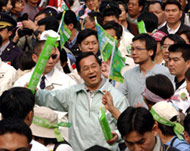Taiwanese rally against China law
Taiwan President Chen Shui-bian and hundreds of thousands of Taiwanese have taken to the streets to protest against a new Chinese law threatening the island.

Demonstrators on Saturday marched down 10 major streets in the capital, symbolising the 10 clauses of China‘s anti-secession law, before congregating for a rally in the presidential square outside Chen’s office.
Wearing green headbands saying “democracy, peace, protect Taiwan“, marchers sang songs and waved placards condemning the law, which gives China‘s military the legal backing to invade should Taiwan move towards formal independence.
Dima al-Khatib, Aljazeera’s correspondent in Taiwan said thousands of farmers, peasants and villagers, travelled in buses from rural areas in southern Taiwan to the capital to join the protests.
Replicas of tanks and missiles were also displayed to ridicule Beijing‘s military deployment against the island.
“Love peace, oppose war,” some demonstrators shouted, many dressed in colourful costumes and marching behind bands.
“Say yes to Taiwan, no to China” said one group of banners at
what the rally’s organisers called a “democratic carnival”, one of the largest ever seen in Taipei.
Peaceful protest
Chen was accompanied on the protest by his daughter, son-in-law and grandson. The high-profile group was flanked by about 500 police officers.
The Taiwanese president and his ruling Democratic Progressive Party (DPP) had urged one million people to take to the streets to peacefully express their anger and rejection of the new Chinese law, which was passed by the Chinese parliament last week.
Al-Khatib said the DPP had asked for permission to carry out the demonstration as a musical concert, rather than a political protest.
 |
|
Taiwanese President Chen (C) |
“The hostile legislation puts Taiwanese children’s future in danger of war. I want our children to be safe, I want peace for Taiwan and I don’t want missiles,” said Shih Ting-ching beside her five-year-old daughter.
The girl was one of the 706 children who had anti-war stickers put on their hips to protest against China‘s deployment of the same number of ballistic missiles targeting the island.
“I oppose Chinese aggression. Taiwan must not become a second Hong Kong. We are entitled to the freedom and human rights we have been enjoying,” said a Taiwanese man who had business interest in China‘s Guangdong province.
A DPP spokesman said the party expected a minimum turnout of 800,000, but police put an early estimate of the crowd size at 200,000.
Peace and stability
Chen, who accused China of jeopardising cross-strait peace and stability by adopting the law, said on Thursday he was participating in the protest to “shout aloud to the other side that we want democracy, we want peace and we are against war”.
President Chen is not expected to deliver a speech in front of the protesters as Washington asked him not to increase tensions with Beijing, Aljazeera’s al-Khatib said.
|
“We want democracy, we want peace and we are against war” |
Prime Minister Frank Hsieh and many other high-ranking government officials were also among the protesters. Former president Lee Teng-hui, now a staunch advocate of independence, was leading one of the 10 protest groups.
About 30,000 police were mobilised to guard the event, local newspapers said.
Military force
Although Taiwan has been ruled as a de facto independent state since 1949, China considers the island part of its territory that must at some stage be brought back under its control, by force if necessary.
Taiwan authorities have slammed the law as tantamount to issuing the Chinese military a blank cheque to invade the island, leaving people in constant fear of war.
Cross-strait ties have worsened since Chen won the presidency in 2000, breaking a 51-year grip on power held by the nationalist Kuomintang. He was re-elected in 2004.